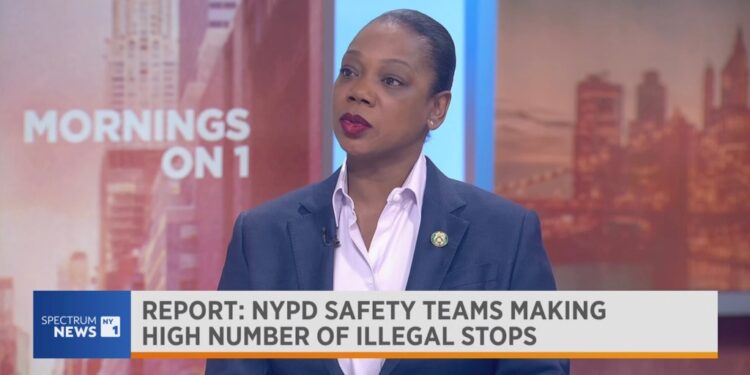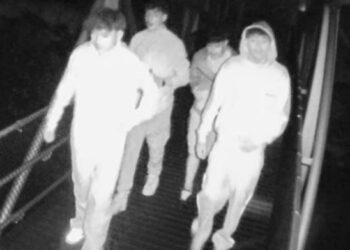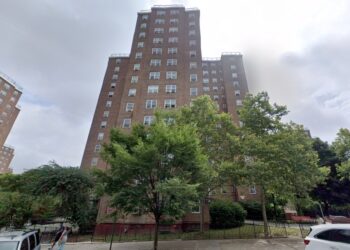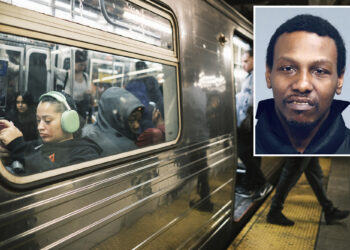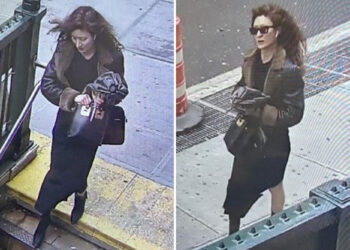NYPD Commissioner Keechant Sewell says she “100 percent” objects to the notion that the NYPD’s revamped anti-crime unit is making deliberate, illegal stops — as she responded Friday to a scathing new federal report that found fault in nearly a quarter of those interactions.
In a Friday morning NY1 interview, the top cop was questioned about a recent report by the department’s federal monitor Mylan Denerstein, who concluded that 45 of the 184 encounters made by the Neighborhood Safety Teams in the second quarter of 2022 – or 24% – did not have a reasonable cause.
Asked whether Sewell “takes exception” to calling the NST’s stops “illegally conducted,” she said she does — adding that the squad’s errors are often inadvertent and come down to officers’ misunderstandings or miscommunications.
“100 percent, I take exception to that,” she said.
“What we’ve seen most often than not is that there’s an inability or a training issue when it comes to articulating the level of stop that they are at,” Sewell added. “Oftentimes, it’s an officer believing they [have] reasonable suspicion without founded suspicion.”
“So we’ve addressed that with training,” she said. “We’ve addressed that with oversight.”

“Our professional standards bureau weekly goes over the body-worn cameras with Neighborhood Safety Teams [in order] to have them articulate what they saw that rose to the level of a search, and to be able to correct [them] when we see these stops are being handled inappropriately.”
“When there are deficiencies, we will correct those deficiencies,” the commissioner added.
The department conducted its own review of the same stops covered in the audit — finding an “error rate” that was six percent lower than Denerstein’s findings, Sewell said.
“These reasonable suspicion stops are legal and they’re effective, but I will say they have to be done constitutionally,” Sewell said. “When we looked at the monitor’s report and we looked at the same stops that they looked at as well, our error rate was about 18%.”

The monitor’s report, filed in federal court Monday, sounded the alarm about “poor” oversight of Mayor Eric Adams’ highly-touted plainclothes units — saying that none of the stops had raised eyebrows among supervisors.
“Despite training and experience, [NST] officers overall appear to be stopping, frisking, and searching individuals at an unsatisfactory level of compliance,” Denerstein wrote.
“Too many people are stopped, frisked, and searched unlawfully.”
The audit – which involved examining videos, reports and supervisors’ reviews of the encounters – found that 76% of all NST stops had reasonable cause, nine points below the department-wide compliance rate from 2020 of 85%.

“The NSTs’ compliance issues are troubling, and there is insufficient oversight at the supervisor, command, and Department level,” the monitor wrote, adding, “there appears to be very limited accountability.”
The squads were rolled out last year as a key Adams administration initiative to crack down on gun violence.
They were something of a reboot to the department’s controversial anti-crime unit, which was disbanded in 2020, under the last administration.


“I think it’s important to understand where we are versus where we were in 2011, which was the high watermark for stops,” the top cop said. “We were at 684,000 stops at that time. Last year we had just over 15,000.”
When questioned about a disproportionate number of minorities subjected to stop-and-frisk, the commissioner said the NYPD is taking “a victim-centered approach.”
“Ninety-six percent of our shooting victims are black and brown,” Sewell said. “Ninety percent of my homicide victims are black and brown. And we have to address that. We address, we go to the communities that are asking us to come to them and where we see crime spikes.”


